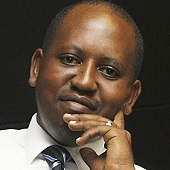Nigeria: An Incentive for South Africa
Bigger GDPs for other countries in Africa are not a zero-sum game.
April 17, 2014

That Nigeria is now Africa’s largest economy is the best news that South Africa could have hoped for.
This milestone not only gives South Africa the most obvious reason to strengthen its ties with a key player across the African continent that is growing in clout. It also affords South Africa the best possible incentive and opportunity to reflect on itself and its future path.
Nigeria should be among the world’s 15 largest economies by 2050, when its GDP is projected to exceed $4.5 trillion in purchasing power parity terms (PPP). This forecast comes from Moody’s, the credit rating agency.
It is also shared by Jim O’Neill, the former chairman of Goldman Sachs Asset Management. He believes that Nigeria has a much better chance to be in the top 15 by 2050 than in the world’s top 20 economies by 2020. The latter goal, O’Neill said, was too soon to be likely.
I tend to agree with him. Before it can realize its full economic potential, Nigeria needs to overcome formidable structural obstacles in the short to medium term. In that regard, Nigeria faces many of the same general challenges as South Africa (and many of the continent’s other economies).
Even so, nothing could be a better indication that Africa is on the rise than Nigeria’s economic ascent.
Much more than a new set of statistics
Nigeria recently completed an exercise to recalculate the constituent parts of its economy. The end result of that recalibration process was that the country’s 2013 nominal GDP was $510 billion, 80% higher than previously reported.
On that scale, Nigeria became a global front-runner overnight. It now ranks as the 26th largest economy in the world. And it did not just surpass South Africa (with a GDP of $356 billion as of 2013) — but also Austria, Venezuela, Columbia, Thailand, Denmark, Malaysia and Singapore.
The latter figure – that Africa’s most populous nation now has a GDP larger than Singapore with almost six million people – shows just how much growth potential Africa still has, if and when it gets its act together for real.
A pacesetter for all of Africa
In many ways, Nigeria’s ascent to the top of the economic league in Africa marks an important development for the African continent as a whole. For the first time, there is now an indisputable sign of the changing economic fortunes in this part of the world.
True, many remain skeptical about Africa’s true economic potential. However, there is a growing body of evidence to show that those who underestimate Africa’s prospects do so at their own peril.
How about South Africa?
I do not subscribe to the notion that Nigeria’s gain is South Africa’s loss. Africans do not believe that Africa’s prosperity would come about as a result of some popularity contest between countries. It is decidedly not a zero-sum game.
In fact, this point was reiterated by Gill Marcus, the governor of the South African Reserve Bank. She said recently that said the real issue was “how do we use our different strength to benefit Africa as a whole”.
South Africa has often talked about the need to build linkages that will lead to a more integrated Africa, from the Cape to Cairo. But now, Lagos has also come into full view.
For South Africa, that means that the emerging future requires the country to pursue a more multi-dimensional approach in engaging with the rest of the African continent.
This approach begins with recognizing that South Africa’s future is inextricably linked to that of all of Africa. That is how Rob Davies, the South African Minister of Trade and Industry, put it last week.
Oil helps
With a population of 170 million and oil reserves estimated at around 37.2 billion barrels (or roughly 28% of total African oil reserves), it should be no surprise that Nigeria has turned out to be the largest economy in Africa.
More than anything, Nigeria represents an important catalyst to fuel the emergence of a more dynamic economic landscape on the African continent. From what I hear, it sounds as if South Africa, my home country, understands what is at stake and its role in bringing about this dynamism.
Moreover, it appears as if South Africa also recognizes the opportunities that are inherent in Nigeria’s economic rise. Rob Davies, our country’s trade and industry minister, hinted that South Africa could even possibly begin pushing for Nigeria’s inclusion into multilateral institutions as the G20.
Stronger together
Such a move would strengthen Africa’s voice in the global governance structures. That would be the smart thing to do. In fact, Africa should not have to wait for 2050 before Nigeria joins South Africa in the G20.
Even with its displacement from the top, South Africa’s economy remains about three times larger than Nigeria’s on a per capita basis. Also, South Africa’s regulatory institutions remain the best on the continent — and our financial markets and banking institutions are rightfully deemed to be the strongest in Africa.
Going forward, South Africa and Nigeria should focus on finding ways to complement each other’s strengths and find ways to draw from the experiences of others to tackle the key issues.
First and foremost, there is the perennial problem of chronic corruption, an all too present problem in both countries. Everything else can then be expected to follow from that.
Takeaways
Nothing could be a better indication that Africa is on the rise than Nigeria's economic ascent.
That Nigeria is now Africa’s largest economy is the best news that South Africa could have hoped for.
Africa’s most populous nation only now has a GDP larger than Singapore with its approx. six million people
Africa has vast growth potential, if and when it gets its act together for real.
Despite all the doubters, those who underestimate Africa’s prospects do so at their own peril.
Nigeria's gain is not South Africa’s loss. It’s neither a popularity contest nor a zero-sum game.
Africa should not have to wait for 2050 before Nigeria joins South Africa in the G20.
Read previous

Birth Rates in Africa: Not Following Asia
April 17, 2014
